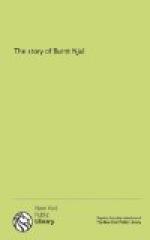When death came it was the duty of the next of kin to close the eyes and nostrils of the departed, and our Saga, in that most touching story of Rodny’s behaviour after the death of her son Hauskuld, affords an instance of the custom. When Njal asks why she, the mother, as next of kin, had not closed the eyes and nostrils of the corpse, the mother answers, “That duty I meant for Skarphedinn”. Skarphedinn then performs the duty, and, at the same time, undertakes the duty of revenge. In heathen times the burial took place on a “how” or cairn, in some commanding position near the abode of the dead, and now came another duty. This was the binding on of the “hellshoes,” which the deceased was believed to need in heathen times on his way either to Valhalla’s bright hall of warmth and mirth, or to Hell’s dark realm of cold and sorrow. That duty over, the body was laid in the cairn with goods and arms, sometimes as we see was the case with Gunnar in a sitting posture; sometimes even in a ship, but always in a chamber formed of baulks of timber or blocks of stone, over which earth and gravel were piled....
CONCLUSION.
We are entitled to ask in what work of any age are the characters so boldly, and yet so delicately, drawn [as in this Saga]? Where shall we match the goodness and manliness of Gunnar, struggling with the storms of fate, and driven on by the wickedness of Hallgerda into quarrel after quarrel, which were none of his own seeking, but led no less surely to his own end? Where shall we match Hallgerda herself—that noble frame, so fair and tall, and yet with so foul a heart, the abode of all great crimes, and also the lurking place of tale-bearing and thieving? Where shall we find parallels to Skarphedinn’s hastiness and readiness, as axe aloft he leapt twelve ells across Markfleet, and glided on to smite Thrain his death-blow on the slippery ice? where for Bergthora’s love and tenderness for her husband, she who was given young to Njal, and could not find it in her heart to part from him when the house blazed over their heads? where for Kari’s dash and gallantry, the man who dealt his blows straightforward, even in the Earl’s hall, and never thought twice about them? where for Njal himself, the man who never dipped his hands in blood, who could unravel all the knotty points of the law; who foresaw all that was coming, whether for




